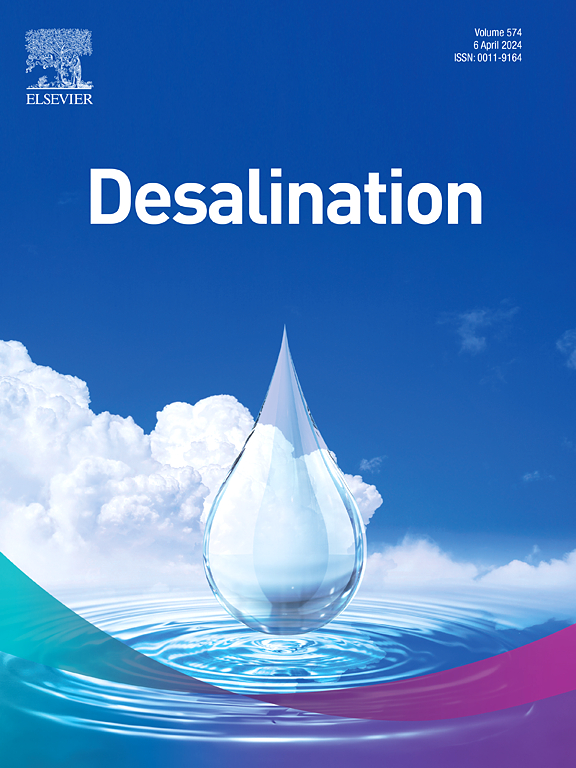先进膜分离技术在污水处理和海水淡化中的应用综述
IF 9.8
1区 工程技术
Q1 ENGINEERING, CHEMICAL
引用次数: 0
摘要
废水处理是水资源管理的一个重要组成部分,对于确保水的再利用和保护环境健康和人类福祉至关重要。现代废水的数量增加,往往含有关键污染物,加上处理工艺缺乏进展,导致未经处理或处理不良的废水排放到淡水资源中。虽然传统的处理方法具有一定的有效性,但它们在生产高质量的处理水以及解决与家庭和工业应用相关的关键挑战方面存在不足。这加强了对先进分离技术的需求,以处理当前的废水管理问题。其中,膜技术因其去除有机污染物、有毒物质和其他低浓度营养物质的能力而备受关注。因此,本文综述了先进的废水分离技术在提高处理效率和资源回收方面的重要性。主要评价了综合分离技术和混合分离技术在膜技术废水处理中的性能。本文的思想是通过讨论不同膜技术之间或与各种高级氧化工艺(AOPs)的集成来总结传统膜技术的发展,以增强膜的性能,包括它们的污染和湿润缓解策略。此外,本文还探讨了新型纳米复合材料在膜技术中的应用,评估了它们在解决废水处理中膜分离过程中存在的主要缺陷方面的有效性和潜力。最后,对该领域未来的研究方向进行了展望。本文章由计算机程序翻译,如有差异,请以英文原文为准。
Exploration of multifaceted domain of advanced membrane separation processes for wastewater treatment and desalination – A review
Wastewater treatment is a crucial component of water resource management, essential for ensuring water availability for reuse and protecting both environmental health and human well-being. The rise in the volume of modern-day wastewater, often containing critical pollutants, and lack of advancements in treatment processes leads to the discharge of untreated or poorly treated wastewater into freshwater sources. While conventional treatment methods offer some effectiveness, they fall short in producing high-quality treated water and addressing key challenges associated with it for domestic and industrial applications. This has intensified the demand for advanced separation techniques to handle current wastewater management issues. Among these, membrane technology has garnered significant attention for its ability to remove organic contaminants, toxic substances, and other low-concentration nutrients. So, this review aims to emphasize the importance of advanced wastewater separation techniques, particularly their role in enhancing treatment efficiency and resource recovery. It mainly evaluates the performance of integrated and hybrid separation technologies for wastewater treatment with respect to membrane technology. The idea of this paper is to summarize the evolution in conventional membrane technology by discussing the integration of different membrane techniques with one another or with various advanced oxidation processes (AOPs) for membrane performance enhancement, including their fouling and wetting mitigation strategies. Additionally, the review explores the application of novel nanocomposites in membrane technology, assessing their effectiveness and potential for addressing major drawbacks associated with membrane separation process during wastewater treatment. The paper concludes with a discussion on future research directions in this evolving field.
求助全文
通过发布文献求助,成功后即可免费获取论文全文。
去求助
来源期刊

Desalination
工程技术-工程:化工
CiteScore
14.60
自引率
20.20%
发文量
619
审稿时长
41 days
期刊介绍:
Desalination is a scholarly journal that focuses on the field of desalination materials, processes, and associated technologies. It encompasses a wide range of disciplines and aims to publish exceptional papers in this area.
The journal invites submissions that explicitly revolve around water desalting and its applications to various sources such as seawater, groundwater, and wastewater. It particularly encourages research on diverse desalination methods including thermal, membrane, sorption, and hybrid processes.
By providing a platform for innovative studies, Desalination aims to advance the understanding and development of desalination technologies, promoting sustainable solutions for water scarcity challenges.
 求助内容:
求助内容: 应助结果提醒方式:
应助结果提醒方式:


